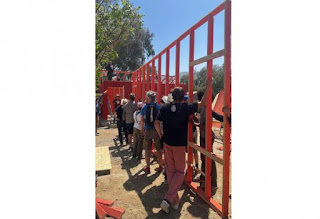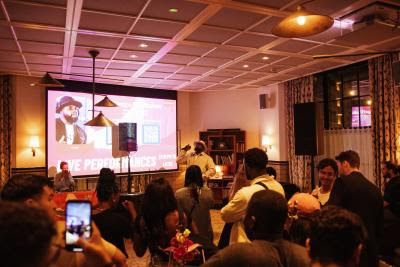Professor Steven Friedman is no stranger to us and it's a pleasure to have him back to update us on the latest political developments that may very well change between now and our meeting on Wednesday.
He welcomes questions and his analyses are often controversial.
“That South African democracy has survived three decades largely intact has confounded predictions and needs explaining. The chief reason lies in the persistence, post-1994, of strong concentrations of private power, which have checked authoritarian impulses in government. While this has ensured democracy’s survival, it has also ensured that its defense has largely been mounted in the language of white, middle class, suburbia – and that freedom is largely seen as the protection of the economic and cultural domination of the few”
Saturday 1st March: Business Meeting
The idea is that the meeting be held at The Grand Slam Sports Diner, Edenvale at 10:00 to be followed by lunch/brunch. We are currently awaiting to hear confirmation of availability.
Last Week
Many thanks to Jim Rankin for the following synopsis of last week's speaker...I was unable to attend.
Julian Apfel – District Grandmaster - District Grand Lodge of Central South Africa _Scottish Constitution
Julian Apfel was invited to talk to the Club about Freemasonry after they had were involved in our
Robbie Burns evening on Saturday 25th January.
The principal idea of Freemasonry as a fraternal organization is to take a good man and make
him a better man. A better man internally as well as externally, a better citizen of his
community and country, a better husband and father to his children, a better friend and co-
worker.
There are five basic requirements for Membership in a Masonic Lodge. They are as follows:
1. Being a man, freeborn, of good repute and well-recommended
Being a man – as Freemasonry is a Fraternity or all-male organization, this is a must as the
lodge does not admit women. There are, however, Masonic organizations which do.
A prospective member must be of good repute and sponsored by someone who knows his
reputation in the community. It is important that a member not be admitted who would stain the
reputation and principles of the craft.
2. A belief in a Supreme Being
No man can be made a Mason if he is an atheist. All masons must profess a belief in a
Supreme Being. This is an area where Freemasonry often comes under attack by religious
opponents. Because Freemasonry accepts Christian, Muslim and Jew alike, how that member
chooses to worship God, or by which name that member knows God, is of no consequence to
Freemasonry.
3. Ability to support oneself and family
While not clearly stated in all jurisdictions, this condition is placed so that a prospective member
does not join the craft in the hope of deriving financial benefit from the order. It also is in place to
show the prospective Mason that the Lodge comes after his religious and family responsibilities.
4. Of lawful age
The prospective Mason must have reached the age of 21, although some constitutions allow a
member to join at an earlier age.
5. Come to Freemasonry of their “own free will and accord”
Freemasonry, long regarded as a secret organisation, is making efforts, under Julian’s initiative,
to become more open and get involved in charities requiring their support. It is probably one of
the biggest and oldest charitable organisations in the world.
Next Week
I am not sure what will be happening. The Business Meeting that we would normally have is being moved to Saturday morning so let's wait and see.
International - Australia/USA
An Indigenous Group Study Exchange from South Dakota, US, to south-western NSW has highlighted the shared experiences of both country’s First Nations Peoples.
A group of Native Americans from the Sioux Nation spent time travelling through south-western NSW on a Group Study Exchange from October 15 to November 2.
Kibbe Brown, of the Rotary Club of Rapid City Rushmore, US, and team leader of the Oceti Sakowan group of Lakota Nations people from South Dakota, said Australian Aborigines and Native Americans share significant parallels.
“These include their deep connection to the land, traditional hunter-gatherer lifestyles, the experience of colonisation and displacement by European settlers, disruption of their cultures through assimilation policies, and ongoing struggles for land rights and social justice,” Kibbe explained.
“These are often marked by high rates of poverty and health disparities within their communities. Both groups also have diverse languages and cultural practices across different regions.”
The team toured outback NSW, visiting Orange, Condobolin and Wagga Wagga, before arriving at Mittagong for the Rotary District 9705 Conference, which includes most of south-western NSW and the ACT.
Last year, five Wiradjuri from these areas – team leader Lynette Bullen, of the Rotary Club of Orange Daybreak, Eddie Whan from Wagga Wagga, Tennille Dunn from Condobolin, Mick Newman from Orange and Ethan Williams – visited seven of the nine reservations across South Dakota.
Rotary Group Study Exchanges have been happening for decades, but this time the emphasis was on the Indigenous delegates understanding First Nations issues, enterprise, community support, arts and education, health frameworks, challenges and developments.
“We had the most incredible time,” said Kibbe. “We were so warmly welcomed by our Wiradjuri aunties and uncles and in each place we shared and learned.
“It was a very robust agenda and we returned home with best practice ideas in the areas of health, education, business and culture.”
The team spoke at the Rotary District 9705 Conference in the Southern Highlands on October 26.
It was poignant timing as it coincided with US President Joe Biden’s formal apology to the Native American community for a 150-year-old Indian boarding school policy.
The US Federal Government established Indian boarding schools from 1819 until the 1970s that forcibly removed children from their homes and families.
Biden said the policy aimed to culturally assimilate Indigenous children and called it a “sin on our soul”. He apologised for the “blot on American history”.


.jpg)






.png)




